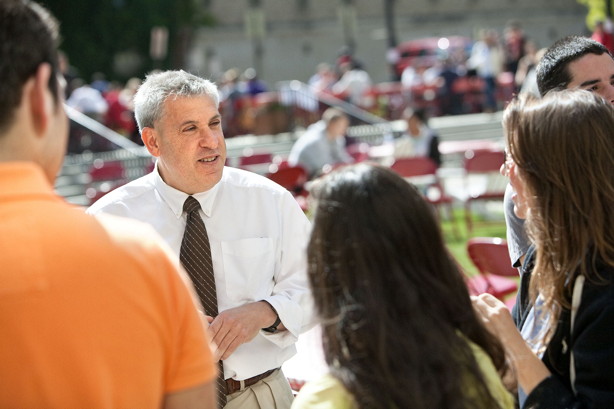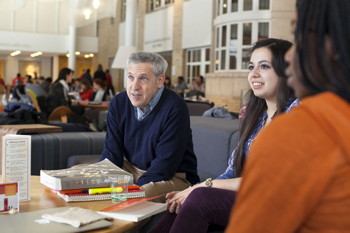COVER STORY
Alan Mathios

Alan Mathios, dean of the College of Human Ecology, chats with students as they make their way down the line at a college barbecue during a recent Commencement Weekend.
What do you predict happening in the near future that will be the most significant change for students?
Cornell has been experimenting with online tools for a long time, but I think massive open online courses, MOOCs, are fundamentally different and will change the way we deliver education in the residential environment. More and more, students will be looking at the same lecture material that's presented in online forums, but then the real education will come, in some sense, in the way we interact with that material in the classroom.
Also, as I see the college develop over the next decades, I see our students going into important fields, fields that I think are going to be key to the future, like our focus on health and well-being, nutrition, policies that focus on families. In 20 years, I think our alumni will be in a very influential set of occupations and will continue to help our students connect their learning to places beyond campus.
But, if you went back and asked graduates of 20 years ago if there'd be an MRI facility in this college, people would just shake their heads. We've always been interdisciplinary, but the world, and the [National Institutes of Health] explicitly, is just now catching up to this way of thinking. So it's not surprising that we're leading the Cornell Population Program, which includes 90 faculty from across the university. And there's the MRI facility and a new [developmental psychology] program with the Law School. Twenty years from now you're going to see even more of that multidisciplinary approach. The lines between colleges are going to fade. In 20 years, you won't be able to tell what's extension and what's research.

Human Ecology Dean Alan Mathios meets with students in the Human Ecology Commons. See larger image
What is one thing most people outside your college don't realize about it?
The scope of what goes on in the college. If you're looking in the windows of our new building, you'll see apparel studio sewing machines, and I think people associate that with our college and the history of our college. But right above that, on the first and second floors, are nanotechnology labs, anatomy labs, and almost every one of our rooms has a fume hood for bench science research.
The other thing that would surprise people is our externally sponsored research: It amounts to about $25 million per year, close to one-third of our revenue.
What was one initial belief you had about your role as dean that was proven completely wrong?
The surprise for me was the pure joy of the alumni affairs and development side of the job.
What percentage of your job is that?
The provost just asked me that. I told him about 30 to 35 percent.
I underestimated how much I'd miss the teaching, and I underestimated how much my connection to the alumni would make up for that. It's an incredible experience to see the dedication that they have to Cornell broadly and their connection to the college and how much they enjoy hearing what's going on. Their enthusiasm and input makes the work more fun than I expected.
What's the most profound thing you've learned from another dean? (You meet often, don't you?)
We meet every Tuesday for two hours, which is unique actually. When I was co-chairing the accreditation self-study for [the Middle States Commission on Higher Education] and we discussed how often deans meet, they were very impressed. Vice provosts and often the VPs are asked to attend. We have great discussions about virtually everything facing the university.
I think what I was most impressed with in these past few years was watching the confidence that Dan Huttenlocher had putting the [Cornell NYC Tech] campus proposal together, with Lance Collins. Watching the energy level they put forth, the quickness with which they were able to do it, the level of enthusiasm they had. I learned a lot about persistence. At times, the contest was really viewed as a shoo-in for Stanford. If you have the drive and the energy, you can do anything at Cornell. It was great to see it succeed.
What are your college's biggest challenges?
I think the budget challenges that face higher education.
Isn't every dean going to give that answer?
You know, sometimes I say, "The real scarcity is in great ideas."
I often say that first. But now we're awash in good ideas, and the challenge is going to be to pull them off. The cost of doing research has escalated. The start-up packages for labs, these are very significant college investments. If the NIH and the government cut back on investments in fundamental research at universities, all of Cornell is going to feel it.
The commitment to need-blind admission is so fundamental to Cornell that sustaining the fundraising for scholarships is going to be essential, too.
Earlier, I would have said that replacing the faculty is among the biggest challenges we face, because of the large number of retirements coming down the pike. But I'm so convinced that we are doing it successfully already that I'm not going to give that answer. In my first term, we hired 30 faculty members, so already one-third of the faculty are new. The quality of professors we've hired is phenomenal. I expect by the end of my second term, I will have replaced half the faculty of the college.
How do you define yourself, outside of your job as dean?
As a father and a husband. And I love to hike. My dream is to hike the Appalachian Trail. I've done a lot of parts of it, most of the Northeast area, in two-day snippets. And I like to read books outside my area – a lot of biographies.
The DeanAlan Mathios, the Rebecca Q. and James C. Morgan Dean of the College of Human Ecology At Cornell since 1992 Dean since July 2007 (interim dean until July 2008) Area of expertise: Impact of government regulation on consumer welfare The College of Human EcologyPopulation: 98 faculty members, 1,227 undergraduates, 291 graduate students Major areas of future growth: translational research, neuroscience, fashion and fiber innovation, public policy Endowment: $76.5 million (as of February 2013) Cornell Now campaign goal/amount raised to date: $30 million/$11.3 million (as of March 2013) |
<<View entire story as one page>>